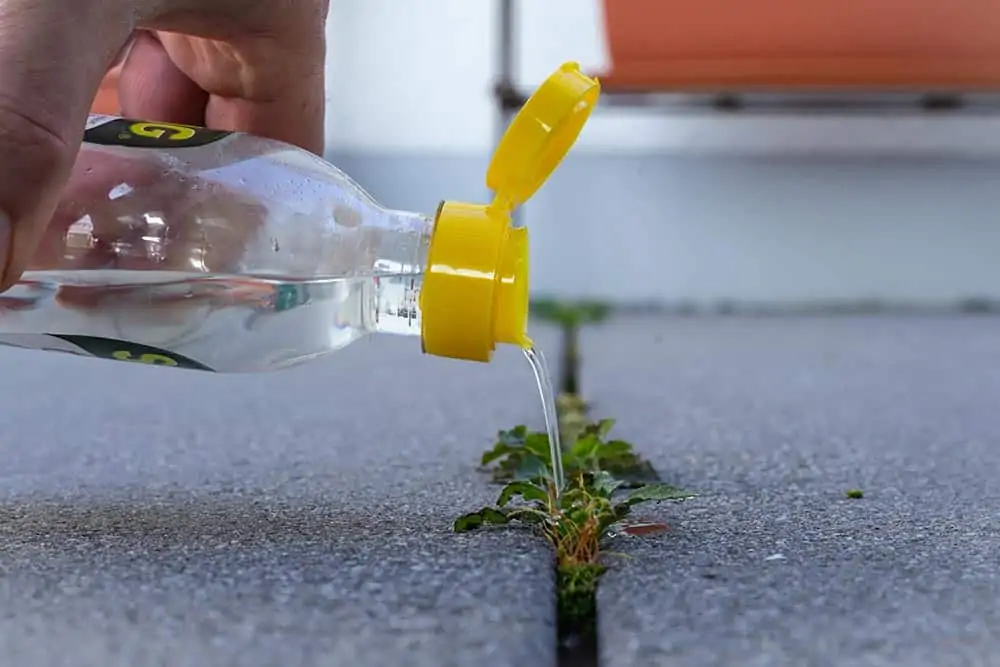Vinegar is one of those ingredients that is used in almost all DIY home remedies. Whether it’s for food-related purposes, cleaning, getting rid of hard stains, or even taking care of the garden. It’s a multi-purpose must-have.
When it comes to garden care, vinegar is most often used in regards to weed control and killing off all unwanted weeds.
But here’s the important question, does vinegar kill grass?
The answer depends on the amount of vinegar that you’re using in the solution that you’re spraying on your garden. But as a general rule, if the vinegar is strong enough to kill the weeds, it will also be strong enough to kill the grass and other surrounding plants. So…yes, vinegar can kill grass!

If you want to avoid this, then the best way to go about killing your weeds with vinegar is to pour the vinegar directly onto the weeds or to rub it onto them individually.
That way, you will get the vinegar on the weeds, to kill them off, but you won’t get any vinegar on the surrounding grass, so it won’t be at risk of also dying!
If you’ve accidentally sprayed your grass with the vinegar you’re using to kill weeds, you will know within 24 hours whether it dies or not. That’s the rough amount of time it should take for weeds, grass, and other plants to die because of the effects of the vinegar!
Table of Contents
Does vinegar kill weeds permanently?
Weeds are relentless, and a nightmare to every garden owner out there. Using vinegar to kill the weeds can be a cheap and easy method to get rid of them, but does it kill them off permanently?
After all, it’s going to be way too much effort if you have to keep spraying vinegar on them (while being careful not to spray the surrounding grass and nearby plants), and it might end up being a non-effective method after all.
Well, it can sometimes depend on the weeds. But vinegar can indeed kill them off permanently, making it a highly effective and recommended method for weed control!
You can create a home solution of dish soap, water, and 5% vinegar, and spray it onto the weeds (or rub it into their leaves and close to the roots manually).
The best time of day to do this is when there is the most sunlight, as the sun will speed up the process. Vinegar will act very fast, and you might be able to start seeing the effects within the hour. And after a full 24 hours, the weeds should be completely dead (hopefully in a permanent way!)
If the weeds aren’t killed permanently after the first round of vinegar, they will at the very least be weakened, and might therefore end up permanently dead after a second or third round of vinegar.
So don’t give up! Vinegar is 100% worth it as a method to get rid of weeds, and it’s a lot faster-acting and a lot cheaper than most products you can purchase for the job.
How long will vinegar stay in soil?
Once you’ve effectively killed off and removed the weeds, thanks to the use of vinegar, you’ll probably want to plant either grass or some different plants. But will the soil be suitable for new growths straight away, or do you have to wait for the vinegar to completely disappear?
Well, the effect that the acetic acid from the vinegar has on the soil, is that it lowers its overall pH. And yes, this can make it unsuitable for growing new plants or grass.
However, once the last traces of vinegar have disappeared from the soil, the pH should go back to normal, and you should be able to plant new things without any issues.
So how long does vinegar stay in the soil? Well, it depends!
A normal amount of vinegar, sprayed onto the weeds, will likely only last a few days. So after giving it a rest, the soil is ready for new plants.
However, if you were to pour high-concentration vinegar directly onto the soil, then it could take more than a month to completely disappear, so you would have to wait a lot longer before trying to grow new plants there.
You also need to be very aware that vinegar is non-selective, and will attack every plant it comes into contact with. So if you’re using vinegar to kill weeds, and you decide to plant something next to them, the proximity might cause some vinegar to reach those new growing plants, and might kill them off. It’s basically a contact herbicide. As long as you keep it away from the plants you want to see thrive, and the soil you want to use, then it should be fine!
Is vinegar good for plants?
Considering the fact that vinegar is used as a herbicide in the garden, it’s pretty safe to say that it is not good for your plants whatsoever. Vinegar is often used to kill weeds, and it can also kill grass and any surrounding plants it comes into contact with.
So if you want to keep your plants healthy and thriving, do not use vinegar with them!
Will grass grow back after vinegar?
As we’ve mentioned, vinegar can easily kill grass off if it is being used as a herbicide against the weeds in your garden. And maybe you sprayed the grass by accident, or you didn’t realize until it was too late, and now your grass is dead.
But will the grass grow back?
Thankfully, much like weeds, grass is very resilient, and will often grow back pretty fast.
However, vinegar as a herbicide can be used to kill off weeds permanently and does so in two ways: by being applied in a higher and more deadly concentration, and by being used repeatedly, until the weeds weaken and eventually stop growing back.
If you’ve used vinegar to permanently kill weeds, and you’ve used it in the same way on the grass, then it is likely that the grass will also be permanently dead. So be careful of how you use the vinegar around the grass!

